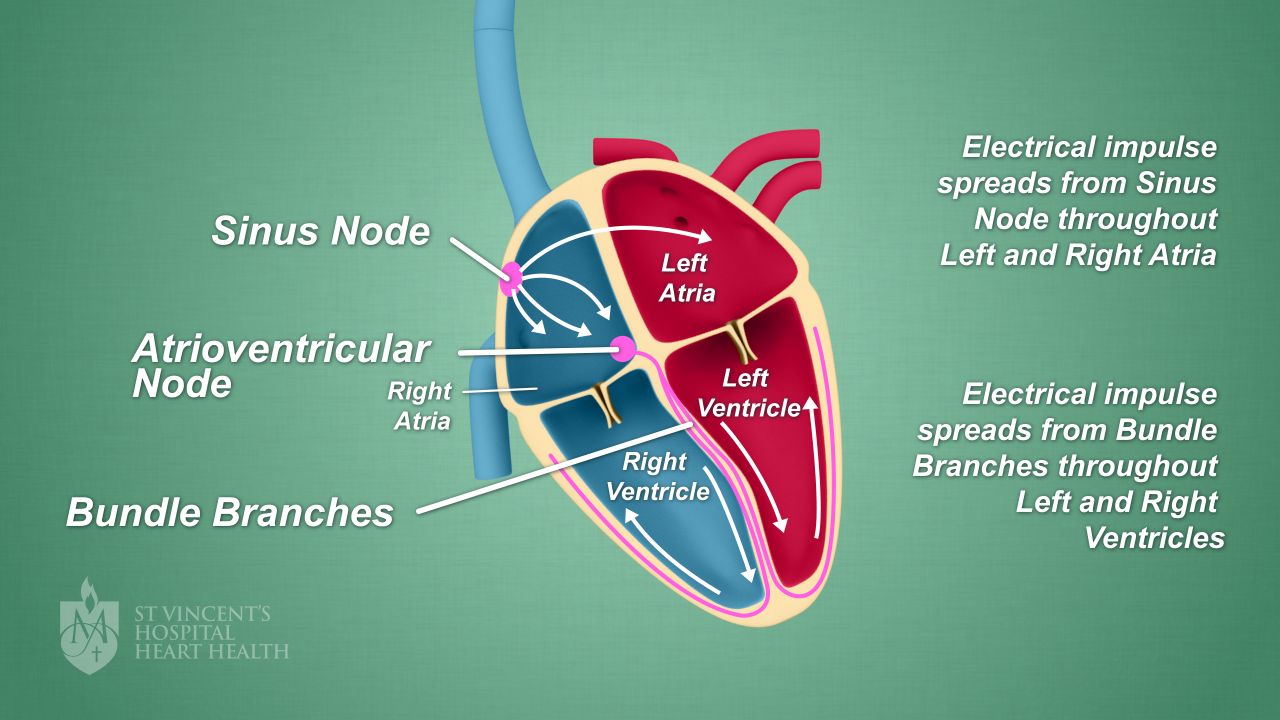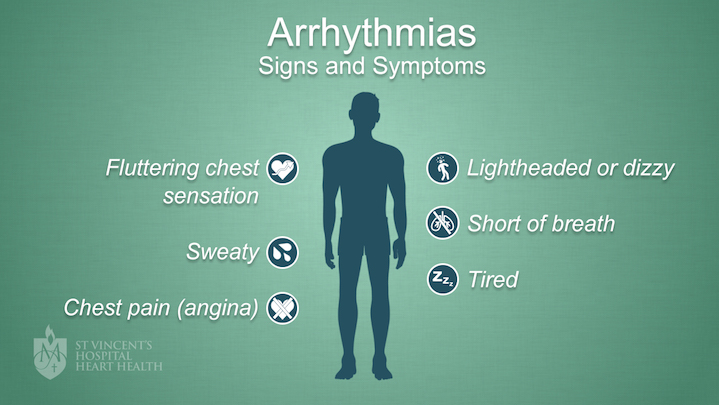Arrhythmias
An arrhythmia is an abnormal heart rhythm.
How does the heart normally beat?
What is an arrhythmia?
What are the causes of arrhythmias?
What are the signs and symptoms of arrhythmias?
What are the possible tests to detect arrhythmias?
What are the possible procedures and treatments for arrhythmias?
What is the future plan if you have an arrhythmia?
How does the heart normally beat?
Your heartbeat is controlled by a very impressive electrical system. It works like this:
- An electrical signal starts at the top of your heart (in an area called the sinoatrial node)
- As the signal travels down it causes the upper part of your heart (atria) to squeeze and pump blood
- As the signal continues to the bottom of your heart it causes the lower part of your heart (ventricles) to squeeze and pump blood
In a healthy heart, the signal usually fires 60 to 100 times every minute.
This diagram below shows the heart's electrical pathway.

What is an arrhythmia?
An arrhythmia is an abnormal heart rhythm. There are two types of arrhythmias: bradycardia – when your heart rate is too slow (less than 60 beats per minute), and tachycardia – when your heart rate is too fast (more than 100 beats per minute).
If your heart rhythm is too slow, your heart may not beat fast enough to supply your body with enough blood. A fast heart rate can be normal after exercise, but if your heart rate is faster than normal when you’re resting then you may have tachycardia.
What are the causes of arrhythmias?
Arrhythmias are usually caused by:
- Coronary artery disease
- Heart valve disease
- Thyroid disease
- Electrolyte imbalances
- Problems with your heart’s electrical system
- Substances like nicotine, caffeine and cocaine
- Medicines such as beta blockers, nicotine, caffeine, alcohol and cocaine
What are the signs and symptoms of arrhythmias?
Not all arrhythmias have symptoms. If you have a short arrhythmia, you might not feel anything. If your arrhythmia lasts for a long time, though, it means your heart probably isn’t pumping enough blood to your body. As a result, you could experience the symptoms shown below:

What are the possible tests to detect arrhythmias?
If your doctor thinks you may have an arrhythmia, you’ll need to have some testing done. Most tests are quick and harmless, so there’s no need to be concerned. An arrhythmia can usually be identified with the following tests or procedures:
What are the possible procedures and treatments for arrhythmias?
Many arrhythmias are harmless and don’t actually need treatment. Your doctor will only recommend a treatment if your arrhythmia is putting you at risk. Treatments aim to help return your heart rate to normal, and can include:
- Medication – your doctor can recommend an appropriate medication plan for you
- Pacemaker – this is a small device, implanted into your chest, which regulates your heart beat
- Implantable cardioverter defibrillator (ICD) – an ICD is a device that keeps track of your heart rate and treats dangerously irregular heart rhythms
- Cardioversion – this is a procedure that returns your heart rhythm back to normal.
- Defibrillation – a defibrillation procedure stops dangerously irregular heart rhythms
- Catheter Ablation – this is surgery to remove scar tissue that may cause your arrhythmia
- Lifestyle changes – eating a healthy diet, exercising, quitting smoking and reducing your alcohol intake are all steps that can help prevent arrhythmias
What is the future plan if you have an arrhythmia?
One of the most important steps you can take as you plan for the future is stay positive. Most of the time, your symptoms are harmless. However, some symptoms are very serious – so it’s important to make regular appointments with your doctor and monitor your condition.
Making healthy lifestyle changes is a crucial step in reducing your risk of developing a serious arrhythmia. Your doctor can help you create a management plan that’s right for you.
If you do have arrhythmias, the good news is that they can usually be successfully treated. Most people with arrhythmias go on to live normal, healthy lives.
For more information about arrhythmias visit our Resources page